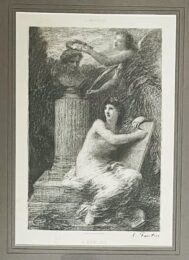

Ignace Henri Fantin-Latour, was born in 1836 in Grenoble of mixed French and Russian parentage. He lived and worked for most of his life in Paris producing flower-paintings, still-lifes, portraits and dream-like fantasies. Though considered essentially an ‘establishment’ painter who exhibited throughout his career at the Salon and the Royal Academy, Fantin associated with the avant-garde, in particular the circle surrounding Manet whose realism influenced the style of his own portraits. Fantin’s respect for contemporary painters, poets and musicians prompted him to honor them in large group portraits, one of the most famous being his Homage to Delacroix from1864.
Fantin worked mainly outside the fashionable art movements of the day, having little in common with the Impressionists. His sources of inspiration derived from artists of the past such as Titian, Watteau, and Chardin, whose works he studied exhaustively in the Louvre. Chardin’s still-lifes found a worthy successor in Fantin’s sumptuous and colorful paintings of flowers and fruit which established his popularity in England, with the help of J.A.M. Whistler.
Fantin’s great passion, however, was reserved for music, especially the compositions of Wagner, Berlioz, and Schumann, which inspired him to create lyrical fantasies in paintings, pastels, lithographs and drawings. Fantin increasingly turned towards idealism in his last years, presaging the Symbolist movement in his search to depict his inner visions. Ironically, it was his flowers and still-lifes which brought him fame and for which he is primarily – and justly – remembered.
In 1876, Henri Fantin-Latour married a fellow painter, Victoria Dubourg, after which he spent his summers on the country estate of his wife’s family at Bure, Orne in Basse-Normandie, where he died of lyme disease on August 25, 1904.
An on-line guide to his complete works can be found at: http://www.henri-fantin-latour.org/